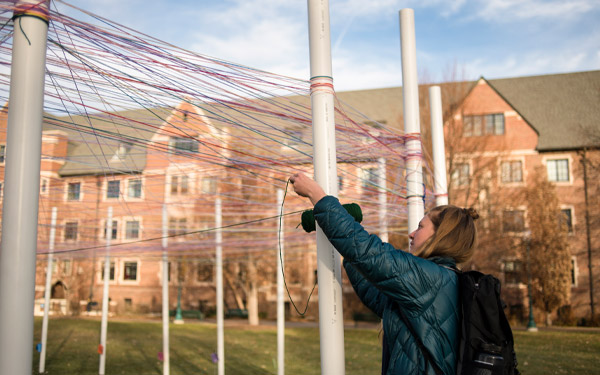Key Jesuit Values
The Mission of the University
As a Jesuit Catholic university, Regis seeks to build a more just and humane world through transformative education at the frontiers of faith, reason and culture.
Elements of the Mission
As a university, Regis draws from wellsprings of ancient wisdom and explores new horizons of thought and imagination to pursue truth, strive for justice, and cultivate beauty. In everything, Regis shepherds the development of the whole person in relation to the common good, asking, “How ought we to live?”
As Catholic, part of a global community of faith called to celebrate and embody God’s love in the world, Regis educates diverse students for lives of service and meaning, equips them with knowledge and skills to be discerning persons in solidarity with others, especially all who are poor or whose dignity has been violated, and empowers them to care for the Earth, our common home.
As Jesuit, rooted in an Ignatian spirituality of Christian discipleship and open to the sacred in all human cultures, Regis aspires to be a community of learners who labor for a transformed world and renewed ecosystem, and who journey as companions, responsible to each other.
Compass Points of Jesuit Higher Education
Cura Personalis
A Latin phrase meaning "care for the person," cura personalis is having concern and care for the formation and support of the whole person well as for each individual person in all their distinctiveness and unique needs. This extends also to holistic care for ourselves and our colleagues.
People For and With Others
A Regis education is not for the benefit of our students alone. Rather, Regis educates students to be agents of change who we hope will join in our mission of seeking a more just and humane world. We educate to form persons of "well-educated solidarity" — striving for the dignity and rights of all people, especially the poor, vulnerable and marginalized.
Contemplatives in Action
Early Jesuits would frequently say that their monastery was the world. Rather than dedicating several hours per day to prayer, they would engage in the work of service, ministry and education, always with an eye toward the transcendent. So too, we enter our work and study with an awareness of the sacred all around us, and strive to cultivate contemplative practices that help us to take "a long, loving look at the real."
Magis
Latin for "the more," magis embodies the spirit of "holy restlessness" — never growing complacent and always longing for that which is greater (which, for Ignatius, was God alone). Magis does not mean to always do or give "more" to the point of exhaustion. Rather, it is the practice of discerning the greater good in each situation or seeking how to better love, serve and glorify God within our limits.
Unity of Minds and Hearts
Across all our diversity and differences, we strive to discern our way forward together in community with unity of purpose. In all things we seek to maintain a deeply relational culture, built on friendship and transparency, communal discernment and commitment to our mission. This does not mean that we always agree — unity does not mean uniformity — rather, that we are committed to thinking and cultivating our compassion together in dialogue and mutual concern.
Finding God in All Things
This may be the one phrase that sums up Ignatian spirituality. It invites a person to search for and find God in every circumstance of life. We trust that God (or: the good, the true, the beautiful) is already everywhere and can be found in all we encounter. This in turn allows us to trust the goodness of creation and the powerful potential of all forms of academic inquiry.

